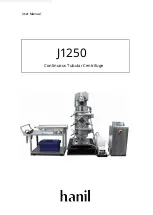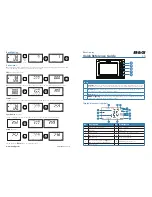
Operation
Humphrey FDT User Manual
2660021149532 Rev. B 2015-11
3-16
FALSE POSITIVE ERRORS - The ratio of the number of times the patient responded to a
“pause” in the testing sequence (i.e., with no target presented) versus the total number of
“pauses” in the testing sequence. Six FALSE POSITIVE catch trials will be randomly
presented for each eye in the C-20 TEST, eight in the N-30 TEST. False positive errors
indicate the patient is pressing the Button even if patient does not see any patterns or the
patient does not understand the test.
FALSE NEGATIVE ERRORS - The ratio of the number of times the patient did not respond to
a test pattern at the maximum possible contrast level of the instrument versus the total
number of times that maximum possible contrast level patterns were tested. Three FALSE
NEGATIVE catch trials will be randomly presented for each eye in the C-20 TEST, five in the
N-30 TEST. False negative errors indicate the patient is likely to not be paying attention,
does not understand the test, or has a severe loss at the location of the FALSE NEGATIVE
catch trial(s).
For the threshold tests, the device utilizes a staircase threshold strategy known as a
Modified Binary Search (MOBS)
1
. The range of possible threshold level values for the raw
data (patient threshold scores) is between 0 dB Maximum Contrast (lowest patient
sensitivity) and 56 dB Minimum Contrast highest patient sensitivity). The formula used to
calculate the dB values is log
10
(2048/c)*10*H where c ranges from 1 (minimum contrast) to
2048 (maximum contrast) and H is approximately 2. Note that XX dB will be displayed, if
the threshold cannot be determined due to inconsistent patient responses which do not
meet the MOBS threshold criteria. The magnitude of the threshold level values is directly
correlated to the Humphrey Field Analyzer values.
The device also provides MD & PSD global statistical indices calculated from points over
the entire visual field for the threshold test. These indices reduce the individual threshold
scores to a single number to provide overall information about the entire visual field. The
magnitude of the MD & PSD values are directly correlated to the Humphrey Field Analyzer
MD & PSD indices. The actual formulas used for the MD & PSD indices calculations can be
found in the references (2, 3).
“The MD (Mean Deviation) index signifies overall severity of field loss. It is affected both by
the degree of loss and the number of affected locations. A positive number indicates that
the average sensitivity is above the average normal for age, whereas a negative number
indicates that the average sensitivity is below the average normal value.”
2
When the MD value is LESS than that of 95% of normal FDT fields, the percentile
probability is given (P < 5%, P < 2%, P < 1%, or P < 0.5%) on the Operator LCD Display
and on the printed report.
“The PSD (Pattern Standard Deviation) index is the standard deviation of the difference of
each sensitivity value from an expected value (based on the normal value at that location
and the mean deviation index), each difference weighted according to the variance of the
normal values at that point. The PSD is small in a normal field, or in a field where all points
are equally abnormal. The PSD becomes large as some points are more affected than
others, and thus the PSD is an index of localized change in the field.”
3
















































